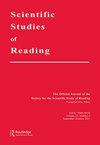有什么区别?词汇歧义、阅读理解和执行功能对三至五年级学生数学单词问题解决的贡献
IF 2.4
2区 教育学
Q1 EDUCATION & EDUCATIONAL RESEARCH
引用次数: 2
摘要
摘要目的数学单词问题解决作为阅读理解的一种形式,由于数学词汇歧义而变得复杂(例如,单词差异可能意味着日常话语中的不同,但在数学减法题中意味着答案)。本研究考察了数学词汇歧义在数学单词问题解决中的作用。方法对521名三至五年级新兴双语(EB)和英语单语(EM)学生进行词汇模糊数学单词知识、阅读理解、词汇广度、执行功能(EF)技能和数学单词问题解决的评估。结果学生对数学的理解少于对数学词汇歧义的常用含义的理解,EB比EM了解的更少。多组路径分析表明,阅读理解和词汇歧义的数学单词知识直接促进了数学单词问题的解决,并部分中介了EFs对数学单词问题解决的影响。结论与语言功能假说一致,语言技能直接支持数学单词问题的解决,并介导EF技能对EB和EM数学单词问题表现的影响。我们的研究结果揭示了EF技能对内容区阅读理解的特定方面做出贡献的特定机制,从而推动了这一领域的发展。本文章由计算机程序翻译,如有差异,请以英文原文为准。
What’s the Difference? Contributions of Lexical Ambiguity, Reading Comprehension, and Executive Functions to Math Word Problem Solving in Linguistically Diverse 3rd to 5th Graders
ABSTRACT Purpose Math word problem solving, a form of reading comprehension, is complicated by mathematical lexical ambiguity (e.g., the word difference can mean dissimilarity in everyday discourse but the answer in a subtraction problem in math). This study examined the role of mathematical lexical ambiguity in math word problem solving. Method Lexically ambiguous math word knowledge, reading comprehension, vocabulary breadth, executive function (EF) skills, and math word problem solving were assessed in 521 3rd- to 5th-grade emergent bilingual (EB) and English monolingual (EM) students. Results Students knew fewer math than common meanings of lexically ambiguous math words, and EBs knew fewer meanings than EMs. Multi-group path analysis indicated reading comprehension and lexically ambiguous math word knowledge contributed directly to math word problem solving and partially mediated the influence of EFs on math word problem solving. Conclusion Consistent with the language function hypothesis, language skills supported math word problem solving directly and mediated the influence of EF skills on math word problem performance for both EBs and EMs alike. Our findings move the field forward by revealing a specific mechanism by which EF skills contribute to a particular aspect of content area reading comprehension.
求助全文
通过发布文献求助,成功后即可免费获取论文全文。
去求助
来源期刊

Scientific Studies of Reading
Multiple-
CiteScore
7.20
自引率
2.70%
发文量
26
期刊介绍:
This journal publishes original empirical investigations dealing with all aspects of reading and its related areas, and, occasionally, scholarly reviews of the literature, papers focused on theory development, and discussions of social policy issues. Papers range from very basic studies to those whose main thrust is toward educational practice. The journal also includes work on "all aspects of reading and its related areas," a phrase that is sufficiently general to encompass issues related to word recognition, comprehension, writing, intervention, and assessment involving very young children and/or adults.
 求助内容:
求助内容: 应助结果提醒方式:
应助结果提醒方式:


